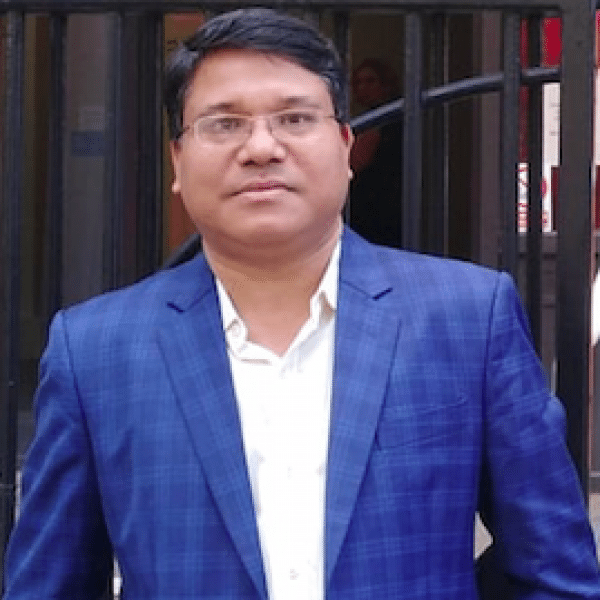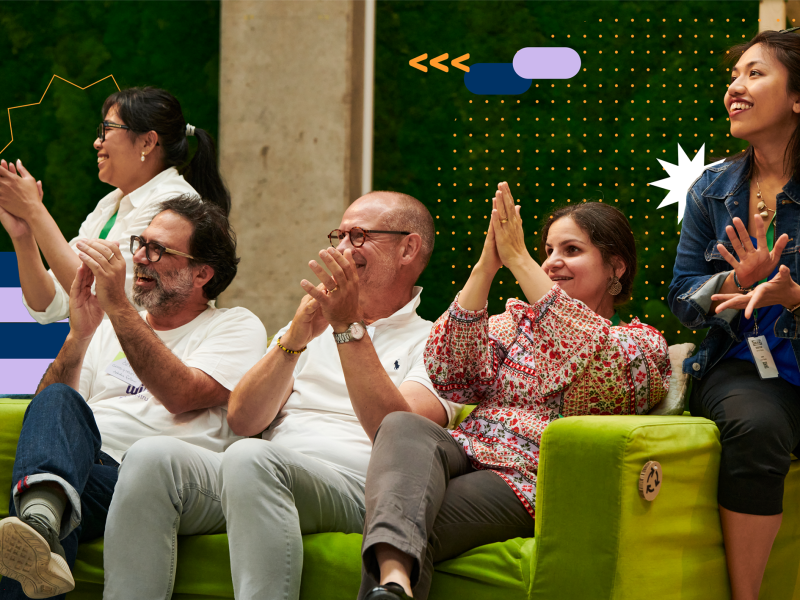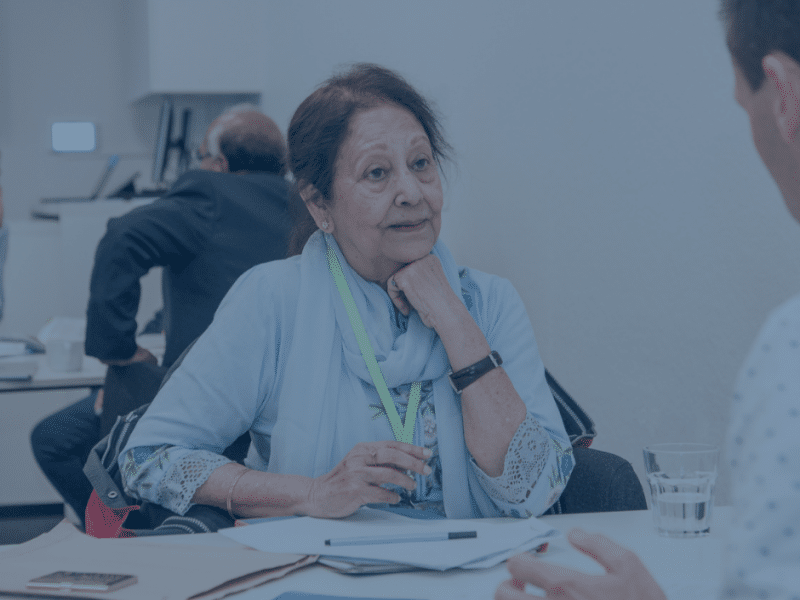Introduction
Albert is working to ensure that Persons with Disabilities in Bangladesh are included in all aspects of development planning in the country. As a result, Albert is opening the opportunity for persons with disabilities to achieve their full potential, become self-sufficient and active contributors to society.
The New Idea
Albert Mollah is ensuring that there is a systematic inclusion of Persons with Disabilities in mainstream development planning in Bangladesh. Working in conjunction with the Convention on the Rights of Persons with Disabilities (UNCRPD), Albert is using a research-advocacy-service framework to shift the roles and opportunities persons with disabilities play in society, via opening up pathways for livelihoods, including them in the development dialogues and creating accepting, cohesive and thriving environments for them in public domains.
Recognizing that a deep-seated stigma has resulted in a lethargic and sympathetic approach towards the development of persons with disabilities in Bangladesh, Albert is reversing the resulting boxed solution approach towards this group by Non-government organizations, Multilateral Banks the Government and other key stakeholders which have historically limited meaningful impact to occur. Through a lean model which is dependent on partnerships, Albert is creatively decentralizing and creating roles for many people to play a part in the development agenda for persons with disabilities, from being one of sympathetic based actions to one that is rights based and gives an opportunity for sustainable livelihoods, skill development, lifelong education, employment and ultimately independence.
The Problem
Persons with disabilities in Bangladesh have historically been recipients of welfare and charity as opposed to being individuals who have the potential to become self- sufficient, active contributors to society and independent. As a result of a deep-rooted stigma towards disabilities, all efforts from government, civil society and communities towards persons with disabilities has been to push them aside and at most, see them as individuals who need to be supported their whole lives through sympathy-based action. This has reflected into budgets that are not inclusive of persons with disabilities, legislation that is welfare-based and not rights-based, a lack of programs across livelihoods, skill development and education that are inclusive and a dominating mindset of hopelessness. As a result, persons with disabilities in Bangladesh continue to be left behind, leading to larger social isolation and overall higher costs for the state and society over time.
It is estimated according to the World Health Organization (WHO) that there are approximately 26 million people in Bangladesh who are disabled, over 15% of the population. Despite the government ratifying the United Nations Convention on the Rights of People with Disabilities (UNCRPD) in 2007, initiatives towards the development of persons with disabilities have largely been absent of legal and constitutional rights, with the maximum being done related to quota systems for educational enrollment, providing education via non-mainstream routes while also nonsensical approaches that overlook the social, infrastructural, financial and environmental barriers that limit the amount a persons with disabilities can do or access. Due to this limiting view and approach, a mindset among institutions such as commercial banks has limited access to things such as capital for persons with disabilities because they are not seen as creditworthy or bankable. Similarly, the dominant mindset from the public has been to socially isolate persons with disabilities and hence become reactive in how they play a role in possibly creating more inclusive environments.
Exacerbating this problem is the fact that the Ministry of Welfare in Bangladesh has been made responsible for all aspects related to persons with disabilities instead of engaging relevant ministries like education, health etc. To address the disability, each ministry of the government has been given a disability focal point, although this has largely remained inactive. The result has been blinded investment and sympathetic based interventions that do not enable persons with disabilities while also creating further disillusionment among this group of people.
While the disability sector in Bangladesh has largely been dependent of policies, both of the government as well as international bodies such as the World Bank and Asian Development Bank, due to a number of reasons, these institutions have been largely ineffective in goals towards inclusive development. One major reason for this is the lack of evidence-based research that is used for advocacy and towards policy making, thus leaving the Bangladesh government to follow conventional approaches of welfare delivery without any long-term developmental objectives for persons with disabilities. The Bangladesh government is also dependent on the support of international development agencies such as the World Bank, Asian Development Bank to support development projects in the country. Historically, the World Bank has no reference of disability in their safeguard policy document. Hence a lot of the funded projects in Bangladesh have not only left persons with disabilities out in the planning process but has not included them in the project life cycle.
The Strategy
Albert believes that in order to systematically include persons with disabilities in the development agenda of Bangladesh, it is important to push the mindsets and activity of key stakeholders who hold policy-making imperative as well as deliver services towards this group. As a continuum to his work, Albert believes in and undertakes research around Bangladesh that captures critical data and information showing the situation for persons with disabilities in the country. Albert uses this evidence-based research as a key tool towards his next step of advocacy level changes. Albert is then able to identify activities of multilateral banks, to advocate for disability-inclusive projects. For example, out of the 67 major projects that the World Bank is currently undertaking in Bangladesh, none of them are disability-friendly from the point of view of both the actual infrastructure being built as well as the acceptance and inclusivity of persons with disabilities. Realizing that the multilateral banks have a dependency on the government and civil society organisations to deliver ‘inclusivity metrics on these projects, Albert works to build the capacity of various ministries in the government to monitor and track the impact of these projects. He works closely with ministers to identify gaps in project proposals and plans and then enables them to integrate disability friendly practices through strategic interventions. For example, Albert was able to follow this process and recently convince the World Bank and relevant government bodies to include disability in the Environmental and Social Framework (ESF).
Albert sees the current government structure which places the responsibility of the care of persons with disabilities to one ministry as being largely inappropriate. He is thus working with the government machinery to restructure their focus on persons with disabilities through creating new ‘cells’ to cater to persons with disabilities among many ministries, such as that of education, health and infrastructure and not just relying on the social welfare ministry. Albert uses the government’s preferred development objective, the SDG agenda to drive strategies across Skill Development, Education, Employment, Health and Community Empowerment that enables the drafting of new policies, implementation strategies and action plans that enables these various ministries to achieve these SDG goals. Albert works with the government as well as large NGO’s such as BRAC to advise them on creating disability-inclusive skills system.
For example, to address challenges related to unemployment, Albert identifies a small group of communities, undertakes demographic research which allows him to split persons with disabilities in those communities into two key groups; those more suited to white-collar jobs and those towards blue-collar jobs. Through holistic and rigorous capacity and skill development programs, he prepares unemployed persons with disabilities with technical skills across a diversification of sectors, including furniture manufacturing, fashion and home-based agriculture to name a few. This is radically different from existing skill development programs for persons with disabilities, which are focused on pushing all into the Ready-Made Garments sector, where there is extreme levels of social stigma and exploitation that takes place.
In order for the loop to be continued, Albert sees the need to work with a large number of active but often ineffective Disability People’s Organizations (DPO’s), who at the implementation stage of various programs work towards many aspects of holistic development of persons with disabilities. Albert has built a collaborative working pattern of DPO’s who work together towards creating more efficient strategies in their programs and delivery models. Albert also sees the need to sensitise media and work with journalists to garner the interest and transfer knowledge to the larger public. Working with platforms such as Daily Star and Prothom Alo, Albert organises reporters to sensitively report on issues related to persons with disabilities, that are rooted in equal, empowering and dignified storytelling. Albert also develops the skills of the persons with disabilities to become micro entrepreneurs in the area of choice and supports them to be able to start up their initiatives. Albert then also works on the demand side at a hyperlocal level, where he works to sensitise communities across rural Bangladesh towards persons with disabilities and uses incentive structures, such as the government's tax exemption incentive (to hire persons with disabilities) to convince these local employers to hire from this community. Albert tracks, monitors and supports the newly employed individuals for six months to ensure that there is a closure to the entire process. Calling this his direct service model, Albert has created a successful framework and process (with the support of the International Labor Organization) that he is now looking to replicate country wide through the government. For example, his work on mushroom cultivation self-employment is now being taken up by the Bangladesh government to be implemented across the country through their mushroom centres.
As a result of Albert’s successful advocacy, the World Bank has for the first time also made its new Environmental and Social Framework (ESF) disability-inclusive. Moreover, because of his close involvement with the Ministry of Social Welfare, Access Bangladesh (his organization) has been given the role of drafting the National Action Plan on Disabilities for the government of Bangladesh. Bringing together a range of stakeholders including DPO’s, CSO’s and NGO’s, the national action plan that was presented and covers 46 government disability focal points. Albert’s successful advocacy has resulted in 24 Union Parishads, three Municipalities, and one city corporation have made their budget disability inclusive. Many of the collective recommendations have been reflected in the national budget as well.
Moving forward, Albert hopes to continue to build the capacity of partners who can replicate the frameworks he is building in employment, skill development, health and education so that all persons with disabilities in Bangladesh can grow up and have the opportunity to live a life that is one that is dignified and respected, by the community around them and also by themselves.
The Person
Albert grew up in a lower-middle-class family in suburban Dhaka. Albert was hugely influenced by his father who played leadership roles in the community. After migrating to Dhaka for college, Alber started working as academic tuition centres in order to generate enough income to pay his tuition fees, but he was regularly delayed in payment from the tuition centres that hired him. As a result, Albert started his own tuition centre with the goal of centralizing and paying tutors on time (something he realized was a problem not alien to himself). Without any planning, Albert was over the course of 3 years able to launch one of Bangladesh’s most well-known and famous tuition centres in Dhaka, that after a period in time had the best teachers placed there. With this, he was able to financially become independent and support his own as well as the education of his other siblings. The realization for Albert was that financial independence was something that was liberating and helped develop a sense of self-worth in an individual.
After university, Albert naturally took the route to work into the Non-government development sector in Bangladesh where he joined the Centre for the Rehabilitation for the Paralyzed (CRP), which works on the holistic rehabilitation and community reintegration of people having disabilities due to spinal injury. During this time he was exposed to persons with disabilities and started to develop a deep connection with this community, seen through the large chunks of time he spent interacting and living with them. This enabled Albert to recognize that persons with disabilities are not what the mainstream portrays them as being but in fact having exception abilities such as focus, patience and discipline, which is being largely underutilized in the country. He also recognized that the stance by the Government and NGO’s has largely been not to mainstream persons with disabilities but treat them as recipients of welfare, further burdening the public system while also creating frictions among the larger public.
While working for CRP, Albert successfully moved up the organization to becoming the youngest CEO of the organization at the age of 31. He realized that most Disability-oriented organizations in the sector work in isolation towards specific disabilities and mostly in the form of welfare interventions, while also alarmingly realizing that most of these organizations themselves didn’t have persons with disabilities employed there. While CEO, Albert also worked closely with the government and learn the policy intervention environment that shapes budgeting. He saw the lack of will, capacity and knowledge of the ministries in terms of making a significant difference to the lives of persons with disabilities at scale in the country, which also fed into the larger conversation around welfare-based approaches in the country.
Building on these insights and feeling limited within his organization, Albert knew that more had to be done to transform the lives and the ecosystem around persons with disabilities. He started Access Bangladesh Foundation with the vision of driving a rights-based approach for persons with disabilities that would ultimately create pathways for a life that garners dignity, self-worth and respect.

 Tile image
Tile image Tile image
Tile image Tile image
Tile image